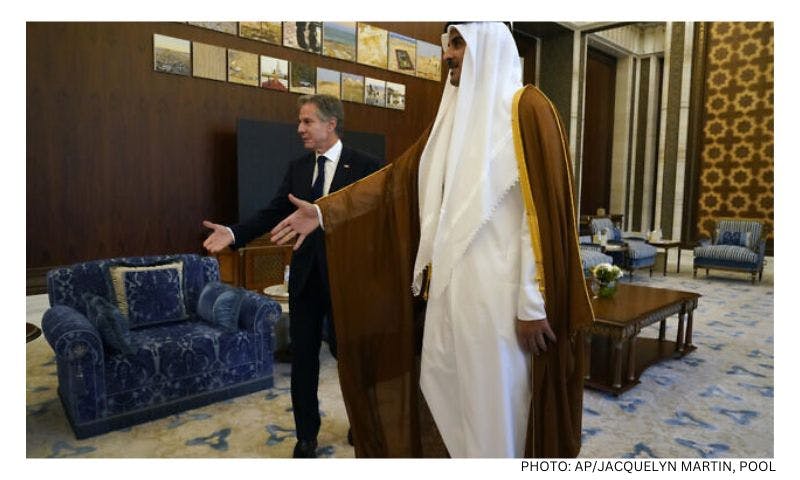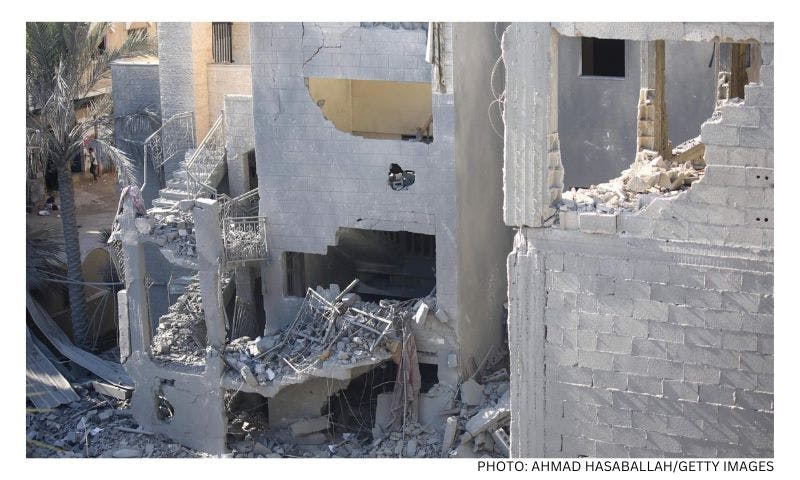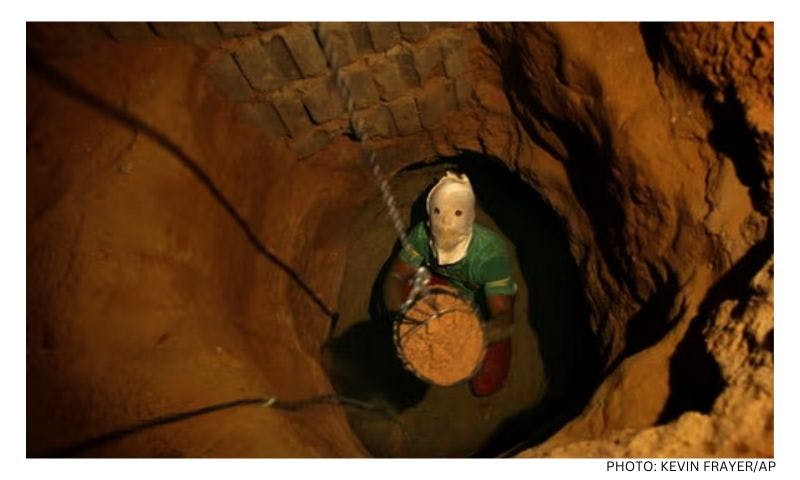Published: 20 November 2018
Last updated: 4 March 2024
Ofran, 42, is director of the Settlement Watch Team of Peace Now, one of Israel’s veteran peace groups. Etkes, 49, is the director of Kerem Navot, an NGO he founded in 2012 to monitor and research Israeli land policy in the West Bank.
Thanks to their work, which took nearly a decade, in 2014 the Israeli government ultimately acquiesced to the repeated demands of the Supreme Court and dismantled the illegal settlement, which had been built, the court determined in response to petitions brought by Peace Now, on private Palestinian land.
The settlers sobbed as they left their homes; many were carried out by force by Israeli security forces. Recalling that moment, Ofran says, “I have no interest in making Israelis feel bad. There are wonderful people in the settlements who also do wonderful things, but these settlements are illegal and they will undermine the existence of the State of Israel.”
Etkes concurs. “It doesn’t make me happy or give me any personal satisfaction to see people thrown from their homes. The work I do hurts the people in the settlements. I do not think they are victims, but that doesn’t make it less painful for them. I know that.”
Ofran and Etkes are the foremost experts in Israel, and probably the world, on Israeli policies in the West Bank. Both grew up in religious environments, are no longer observant, and believe their work is an expression of Jewish values. Both are articulate, enrich their words with Biblical phrases, and speak Arabic fluently.
Both have developed techniques and systems to monitor settler activities, expropriation of lands from Palestinians and other illegal activities – activities the government would often prefer to keep quiet.
And, depending on whom you ask, their work is either a crucial contribution to the State of Israel or a devious plot to undermine its existence.
Lara Friedman, president of the Foundation for Middle East Peace, an American non-profit organisation that promotes a two-state solution, says: “Hagit and Dror do this work for everyone who believes that the rule of law and democracy are important and that ends don’t justify means. They are loyal Israelis and Jews who believe that Jewish values must guide us in how we treat others among us.”
Yisrael Medad has a very different view. The American-born Israeli journalist, author, and an activist in the settler movement, says: “At the very least, they are deeply misguided. But they are untrustworthy, providing unreliable so-called facts and disinformation in the name of their political goals to undermine the settlement enterprise.”
[gallery columns="1" size="large" ids="24262"]
''I SEE MYSELF first of all as Jewish and only then as an Israeli,” says Ofran, “so how the Jewish state acts is very important to me. If we want to hold on to all of the land of Greater Israel, then we must give the Palestinians full rights. That would mean losing our independence as a Jewish people.”
Ofran is a granddaughter of Yeshayahu Leibowitz (1903-1994), the iconoclast writer, philosopher and Torah scholar who was one of the earliest Israeli critics of settlements in the West Bank following the 1967 Six-Day War. He warned that settlers risked becoming “Judaeo-Nazis” – making him an intellectual hero to some and a self-hating Jew to others.
She says Leibowitz had a tremendous influence on her. “My grandfather was always willing to discuss existential matters about life, values and ethics. I liked asking him questions, spending time with him. He was also provocative, and I think that he did that to inspire discussion and action. Being socially engaged was a part of my upbringing.”
Ofran has been director of Peace Now’s Settlement Watch Team since 2007, when she took over the position from Etkes. In the days before information was available on the internet and through freedom-of-information actions, Ofran toured the West Bank regularly, often literally counting new roof-top solar heaters and freshly-paved roads to identify new settlement construction.
Today, she tours less, and has developed the precision, professionalism, and expertise that enable her to put together a detailed picture of Israeli policy from myriad, and often contradictory, sources.
“It’s very complicated to follow what is happening,” she says. “Public monies are being used to establish settlements, and the public doesn’t know anything about it. There is an oligarchy of settlers who have turned their religious beliefs into political plans, and they are so ideologically committed to the Greater Land of Israel that they believe that they are entitled to do anything they want.”
Ofran holds the State of Israel responsible for what she refers to as a “complete lack of transparency. The state and the legal system have put themselves in the service of the settlers. Money comes from different ministries and is very often funnelled through different organisations, some of which exist solely? for this purpose.” There is no end quote, I assumed it was at end of par
She recalls that a few years ago, Prime Minister Benjamin Netanyahu issued a statement in which, in the English version, he claimed that his government had been responsible for less settlement construction than any recent previous government. In the Hebrew version, issued simultaneously, he said that he had built more than any recent previous government.
‘If we want to hold on to all of the land of Greater Israel, we must give Palestinians full rights’
“Both statements were correct, depending how you interpret the data. The confusion and lack of transparency were deliberate,” she says.
The information Ofran collects is published in reports and often serves as evidence for petitions to Israel’s Supreme Court – including the petition thatled to the evacuation of Amona.
Critics like Medad claim that the information is deliberately false. “Peace Now talks about illegalism and anti-democratic processes. But they are the ones who, through their distortions, are forcing the democratically-elected government to make decisions such as the evacuation of Amona.”
He says these activities are anti-democratic because the funding comes from foreign governments and philanthropies and he cites reports that left-wing groups, and Peace Now in particular, have supplied information to foreign governments. What reports?
“That is ridiculous,” says Ofran. “The Americans and the Europeans know what is going on. They monitor settler activity because they know it is illegal under international law and runs counter to their foreign policies.
“The reports and statements we give to the Israeli public are much more important. In a democracy, the public is supposed to scream against the government when it misbehaves. We provide the information.”
Ofran and her family have been threatened by extremists. “Rabin is waiting for you” – a reference to the late Prime Minister Yitzhak Rabin, who was assassinated by a pro-settler extremist – has been spray painted over the entrance to her apartment. Ofran says she doesn’t want to talk about this, adding that she “is confident that the police are doing their job to protect me.”
What has happened to religious Zionism is, she says “a tragedy. It is a form of idolatry, worshipping land instead of God. Instead of seeking redemption through social justice, they have turned it into an issue of geography. This is a distortion of Judaism.”
Instead of seeking redemption through social justice, the [religious settlers] have turned it into an issue of geography. This is a distortion of Judaism.”
ETKES GREW UP in a religious Zionist family in a neighbourhood of Jerusalem built in areas that Israel conquered in 1967. “My family was liberal in many ways. I understand that people have the ability to believe that they are liberals, even though they are living on occupied territory, taken illegally from Palestinians. After a while, you do not to see the Palestinians, because the reality of what you are doing is too uncomfortable, too complex.”
Like Peace Now’s Settlement Watch Team, Kerem Navot issues reports of its findings. In January, it issued a report entitled Cops and Robbers: Distribution of Israeli Police Stations Throughout the West Bank. In June, it published Blazing Saddles: Stables and Horse Farms in Settlements and Outposts in the West Bank.
Etkes was a primary source of information for the Human Rights Watch report issued in May, Bankrolling Abuse, which reveals how Israeli banks profit from settlements and the extent to which their financing is crucial for the settlement enterprise.
“There are lots of ways to take over Palestinian land,” he says, “including, for example, finding all sorts of folkloric, historical, cultural or religious significance to a place, and then saying that it is important for Jewish identity. That is an abuse of power and an abuse of Judaism.”
Friedman believes challenging Israeli government policy is a crucial part of loving Israel. “For all of us, in Israel and abroad, who want Israel to be a moral, healthy society, Hagit and Dror are making an invaluable contribution.” Medad, however, complains that Ofran and Etkes concentrate on illegal Israeli construction, while ignoring the extent of illegal Palestinian construction.
Etkes rejects the complaint. “I can’t accept that there is any comparison between a settler who illegally built his home on private land taken from Palestinians and the person on whose land he builds it. It takes away any meaning to the difference between victimiser and victim, perpetrator and prey.”
He acknowledges that under this government, settlement expansion has continued. “But even if we lose, even if Israel illegally annexes the West Bank, I will know that my work has been important. This work maintains the ideal of civil society that doesn’t back down and doesn’t degrade the value of humanity.”
Etkes, too, has faced threats to his life. “I have no doubt that there are people in Israel who would be very happy if I were not here any longer. Hostile people know where I live.
“It has always been clear the right-wing violence would not be contained in the West Bank or against Palestinians. That’s what we are seeing today. The question is not if, but when, a left-wing activist will be attacked and perhaps killed. And yes, that may be me.”
READ MORE
Oslo is dead, Amichai is alive (Ynet)
25 years after the Oslo Accords, the new settlement Amichai, being built for families evacuated from the illegal outpost Amona, and the nearby outposts that will be annexed to it and legalized, are helping create a Jewish corridor breaking up Palestinian territory in the West Bank and burying the agreements
Photo: Dror Etkes (Edo Konrad)



